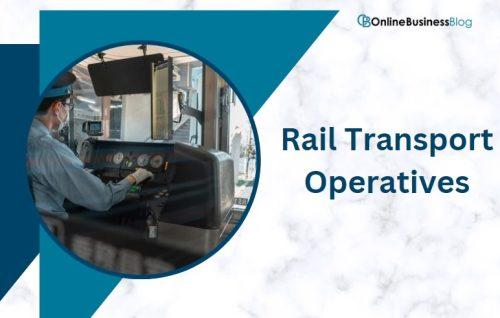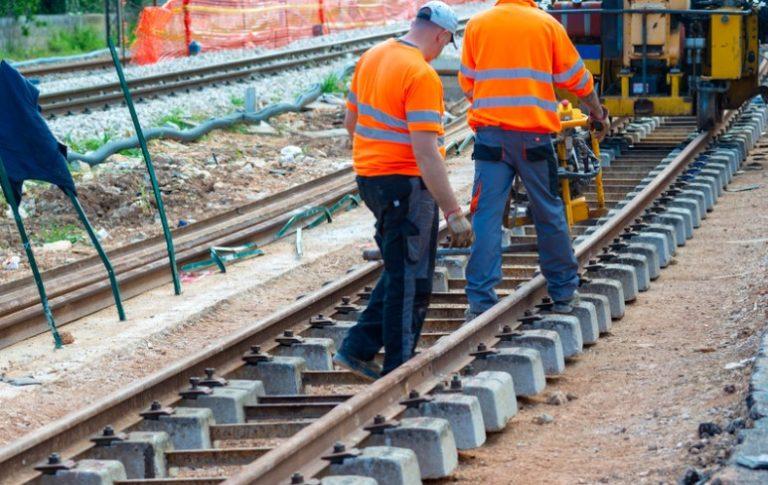Post Contents
All aboard! Have you ever wondered how much rail workers earn in the UK? From train drivers to rail travel assistants, these dedicated individuals keep our railways running smoothly day in and day out. But what is their salary like? In this blog post, we’ll dive into the world of rail workers’ earnings and uncover some surprising facts along the way. So grab a ticket and join us as we explore just how much these hardworking professionals bring home each year. Get ready for an eye-opening journey through the salaries of those who keep our trains on track!
How Much Do Rail Workers Earn?
Train Drivers

When it comes to train drivers in the UK, their payment is far from a one-size-fits-all situation. The amount they receive depends on the company they work for, leading to significant variations in earnings. Starting off as a train driver can make money with an annual salary of around £26,000, but don’t be fooled – this figure is just the beginning. With time and experience under your belt, that number has the potential to skyrocket all the way up to £130,400 per year!
It’s important to note that despite being an integral part of the rail industry workforce, train drivers are not represented by the RMT (Railway Maritime and Transport) union. This distinction means that negotiations regarding pay and working conditions may differ compared to other roles within the railway system.
So if you’re considering a career behind those locomotive controls, keep in mind that your earning potential as a train driver can grow tremendously over time. It’s certainly not an occupation where you’ll be stuck at entry-level wages forever!
Rail Travel Assistants
Rail travel assistants play a vital role in ensuring the smooth operation and safety of the railway system. This category includes ticket collectors, guards, and information staff who assist passengers throughout their journey. According to the Department for Transport (DfT), the average pay for these dedicated workers is £33,310.
Ticket collectors are responsible for checking passengers’ tickets and ensuring that everyone has paid their fare. Guards ensure the safety of passengers on board trains, making sure that they embark and disembark safely at each station. Information staff provide valuable assistance by answering queries, providing directions, and helping passengers navigate through stations.
On the other hand, rail construction and maintenance operatives work tirelessly behind the scenes to maintain and repair tracks. These skilled individuals play a crucial role in keeping our railways safe and efficient. According to DfT data, these workers earn money with an average salary of £34,998.
Both rail travel assistants and construction/maintenance operatives contribute significantly to keeping our railway system running smoothly day in and day out. Their dedication ensures that commuters can rely on efficient transportation while maintaining high safety standards across the network.
Rail Transport Operatives

Rail transport operatives play a crucial role in ensuring the smooth and safe operation of trains. This category includes signallers, who are responsible for controlling the flow of train traffic, and driver assistants, who provide support to train drivers during their journeys.
According to the Department for Transport (DfT), the average salary for rail transport operatives in the UK is £48,750. These workers are valued for their expertise and knowledge of railway systems, which are essential in maintaining efficient operations.
Signallers have the vital task of managing signals and switches to guide trains along their designated routes. Their precision and quick thinking help prevent accidents and delays on the tracks. Driver assistants work alongside train drivers, assisting with tasks such as monitoring speed limits, checking signals, communicating with control centres, and ensuring passenger safety.
The average salary mentioned by DfT reflects the importance of these roles within the rail industry. Rail transport operatives contribute significantly to keeping our railways running smoothly while prioritizing passenger safety. Their dedication ensures that millions of people can travel efficiently across the country every day without major disruptions or incidents.
Cleaners
Railway cleaners play a crucial role in maintaining cleanliness and hygiene across the UK’s rail network. According to RMT general secretary Mick Lynch, these hardworking individuals earn an average annual salary of approximately £32,000. It is worth noting that over 1000 members of the trade union are cleaners who are not officially categorized as rail workers by the Office for National Statistics (ONS).
Despite their essential contribution to keeping train stations and carriages clean, railway cleaners often go unnoticed and underappreciated. Their work goes beyond mere tidying up; it involves ensuring that passengers have a pleasant and safe environment during their journeys.
The fact that these cleaners are not recognized as official rail workers by the ONS raises questions about how they are represented in terms of pay scales and benefits. It highlights a disparity between how certain roles within the industry are classified and acknowledged.
By shedding light on this issue, Mick Lynch brings attention to an important aspect of the railway workforce that is frequently overlooked. The efforts made by these cleaners deserve recognition, fair compensation, and proper representation within industry statistics.
As discussions surrounding wages in the rail sector continue, it is vital to consider all employees’ contributions – including those whose roles may not be officially recognized or categorized but nonetheless play a valuable part in keeping our railways running smoothly.
The Management

Network Rail employs a range of individuals in management positions, each with their own salary structure. Andrew Haines, the chief executive, earns an impressive £588,000 per year. It’s worth noting that he actually takes a lower wage than his predecessor did when he was appointed in 2018. The second highest earner at Network Rail is Jeremy Westlake, the chief financial officer, who brings in £415,000 annually.
Tim Shoveller holds the position of chief negotiator for Network Rail and has an annual salary of £335,000. Additionally, there are five other route managing directors who earn around this same figure. Steve Montgomery serves as both chair of the Rail Delivery Group and director of UK rail for FirstGroup – one of the largest rail operators in the country. While his exact earnings remain undisclosed publicly, it can be inferred that they likely fall somewhere between £300-400k due to six train company bosses reporting to him.
Prior to the collapse of franchises during the pandemic’s onset, managing directors at train operating firms typically earned packages ranging from £200-300k (inclusive of bonuses). Recent accounts show that before being stripped of its contract due to a significant accounting scandal involving £50 million at Go-Ahead-owned Southeastern Railway company in 2020; its highest-paid director received a yearly income amounting to £299k.
These figures highlight some aspects of senior management salaries within Network Rail and associated companies but do not provide a comprehensive overview or analysis of wages across all levels within these organizations.
What Qualifications Do You Need to Become a Rail Worker?
When it comes to pursuing a career as a rail worker in the UK, the qualifications you need will depend on the specific role you are interested in. For those aspiring to become train drivers, there are a couple of routes they can take. One option is to have GCSEs with grades 9 to 4 (A* to C) in English and maths, or their equivalent. Another path is by completing an apprenticeship program.
Once selected for training, aspiring train drivers can expect at least a year’s worth of comprehensive training before they can officially join the ranks of locomotive operators. This training is crucial for ensuring that these individuals possess all the necessary skills and knowledge required for safely operating trains.
For other roles within the rail industry, such as working in train stations or serving as ticket collectors and information staff, similar educational requirements apply. Prospective applicants would be expected to have attained GCSE qualifications meeting the same standard as mentioned earlier.
However, successful candidates for these positions often undergo further evaluation through an assessment day process. During this stage, applicants will face interviews assessing their suitability for customer service roles along with tests evaluating their mathematical proficiency.
Each role within the rail industry has its unique set of qualifications and requirements. Whether it’s becoming a train driver or working directly with passengers at train stations, having appropriate educational credentials combined with strong communication skills is vital for success.
Has Pay Gone Up by 40%?

Mr Shapps made a bold claim about the pay increase for rail workers, stating that there had been a nearly 40% rise in salaries over the past decade. However, when we look at the data provided by the Office for National Statistics (ONS), a different picture emerges.
According to the ONS calculations, in 2011, the median figure for rail workers’ salaries was £35,329. Fast forward to 2021, and that number has increased to £43,747. While this represents an undeniable growth of 24% over ten years, it falls short of Mr Shapps’ claim of a 40% increase.
It’s important to note that this figure includes a significant pay raise of 39% specifically for train drivers who are not predominantly represented by the RMT union. When considering all employees across various industries during this time period, we see a similar average increase of around 23%.
Taking inflation into account – which stood at approximately 20% over the last decade – rail workers have indeed experienced notable wage growth but not quite as substantial as suggested by Mr Shapps.
As we consider these figures amidst ongoing strikes by rail workers demanding fairer wages and working conditions, it’s crucial to understand that their actual pay increases may be lower than what is being reported due to variations among different job roles within the industry.
The statistics reveal that while there has been an upward trajectory in rail workers’ salaries over recent years – with an overall increase of approximately 24% from 2011 to 2021 – claims of a nearly 40% rise seem exaggerated when evaluated against official data and adjusted for inflation.
What Has Happened in 2022?
In 2022, there have been some updates on the salaries of rail workers in the UK. The figures we had so far were for the pay in 2021, but we wanted to get an idea of how things have changed this year. So, we reached out to the Office for National Statistics (ONS) to provide us with estimates for median salaries in 2022.
According to their calculations, the median salary for five categories of rail workers in 2022 is £45,919. This shows a 5% increase compared to last year’s figures. However, if we exclude train drivers from these calculations, the median salary drops slightly to £39,518 but still represents a significant increase of 7% from last year.
It’s important to note that these figures do not include rail cleaning staff who are part of the Rail, Maritime and Transport Workers’ Union (RMT). The RMT argues that these numbers are still too high as they exclude their members working as cleaners who are not officially categorized as rail workers by the ONS.
This update gives us a glimpse into how salaries have evolved within the rail industry in recent times. It highlights both positive growth and ongoing debates regarding fair representation and categorization of certain job roles within this sector.
Conclusion
To sum it up, the earnings of rail workers in the UK vary depending on their job roles and experience. Train drivers can start with a salary of around £26,000 per year, but it has the potential to increase significantly over time. Rail travel assistants, such as ticket collectors and guards, have an average pay of £33,310 according to the Department for Transport.
Rail construction and maintenance operatives earn an average of £34,998 while rail transport operatives like signallers and driver assistants have an average salary of £48,750. Cleaners in the railway industry earn approximately £32,000 per year.
The management positions within Network Rail also come with higher salaries. The chief executive earns £588,000 while other top-level executives earn between £335,000 and £415,000 annually.
Becoming a rail worker requires specific qualifications depending on the role applied for. Train drivers need GCSEs or equivalent qualifications in English and maths or complete an apprenticeship program before undergoing at least a year’s worth of training. Other roles within train stations may require similar GCSE qualifications along with skills in communication and customer service.
Regarding recent pay increases for rail workers claimed by Mr Shapps (Secretary of State for Transport), statistics show that there has been a 24% increase over the last 10 years for five categories of rail workers excluding inflation. This is comparable to the overall increase seen across all employees during this period.
Looking ahead to 2022 estimates provided by ONS indicate further increases in median salaries for rail workers compared to 2021 figures. However, these estimates do not include certain categories like cleaning staff who are RMT members but are not classified as rail workers by ONS.
It’s clear that there is variation in earnings among different roles within the railway industry. While some positions offer starting wages lower than others (£26k/year), they often provide opportunities for growth. The salaries of management positions in Network Rail reflect the higher responsibilities involved.
Overall, rail workers have enjoyed a decent wage increase over the past decade – 24% when adjusted for inflation. The estimates provided by ONS for 2022 indicate further growth in salaries for these individuals. However, this does not include those who are not officially categorized as rail workers by the ONS, such as RMT-affiliated cleaners.
The recent debate surrounding salaries in the rail sector sheds light on an important issue that deserves recognition and fair compensation across all levels of employment within this industry.


